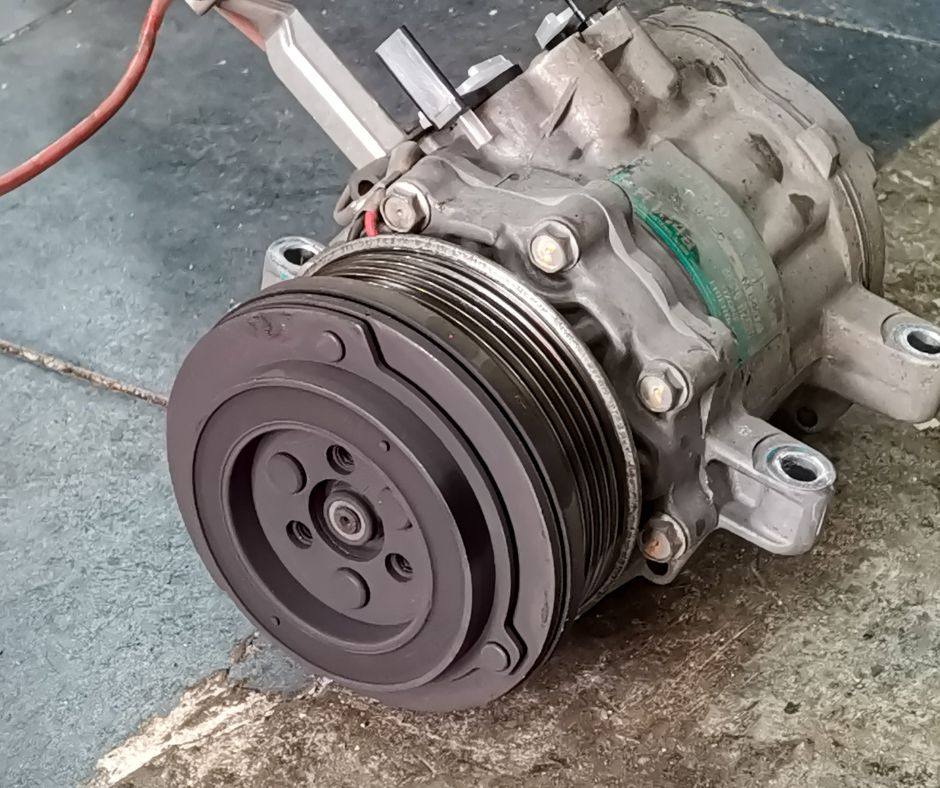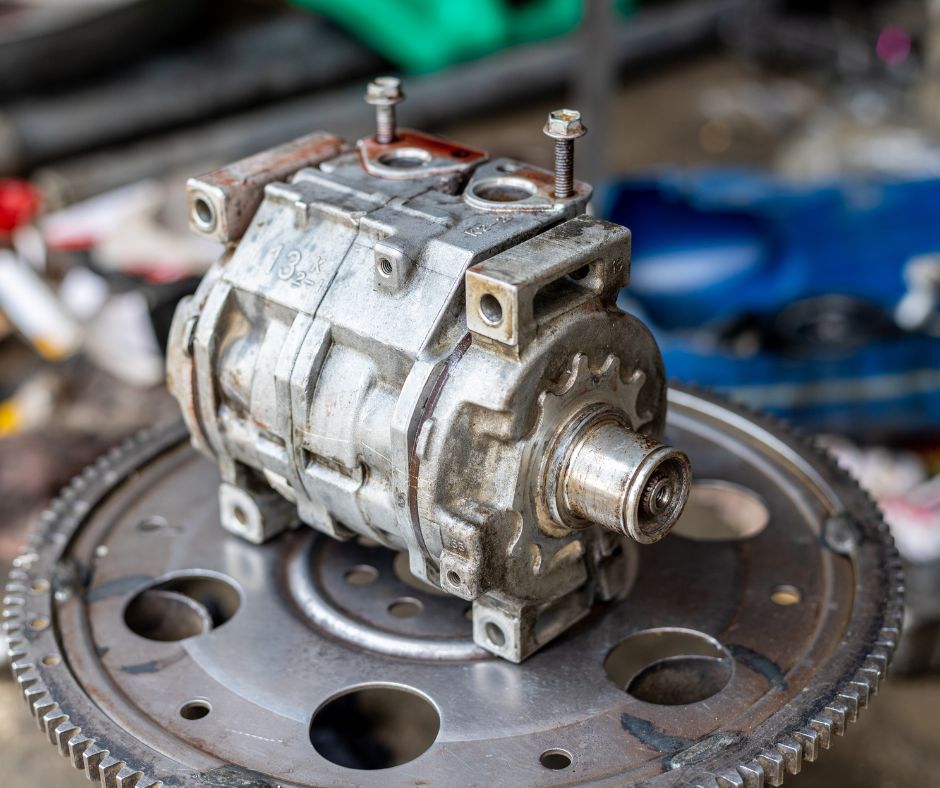Please note that our address has changed, we have moved from Sydney to Brisbane Dismiss
Skip to content
When it comes to surviving the scorching Aussie heat, a car’s air conditioning system is nothing short of essential. It’s one of those little luxuries we often take for granted not until it stops working. Your car’s AC compressor is the heart of the system, working hard behind the scenes to keep cool air circulating in your cabin so that you can drive comfortably even in the hottest weather.
But just like any part of your car, the AC compressor can wear out over time. A failing compressor doesn’t just impact cooling but can throw the entire air conditioning system off balance, leaving you battling the heat in a car that feels more like an oven. Understanding the causes of AC compressor failure causes is crucial to keeping your AC system in its optimal condition.
Think of the AC compressor as the heart of your car’s cooling system. It’s responsible for compressing refrigerant gas and pumping it through the air conditioning system. This high-pressure gas moves to the condenser, where it cools and transforms into a liquid, before circulating through the evaporator to release cool air into the cabin.
Without a functioning compressor, the refrigerant can’t move through the system, leaving your car without cool air. Its efficiency depends on proper lubrication, precise pressure control and seamless operation of its mechanical and electrical components.
Compressor failure is a common headache for car owners and can stem from causes such as mechanical, electrical and maintenance-related problems. Whether it’s due to wear and tear, poor lubrication or electrical faults, these issues can bring your car’s air conditioning to a grinding halt.
Understanding the root causes is key to keeping your AC system running smoothly. In the next section, we’ll dive deeper into the specific causes of AC compressor failure and how they affect your system’s performance.
Understanding the key AC Compressor failure causes can help pinpoint problems early and prevent costly repairs. These include:
Too much or too little refrigerant can cause big problems for your compressor. Overcharging can lead to overheating, while undercharging makes it harder for the compressor to do its job.
Excess refrigerant increases pressure, risking compressor damage, while too little reduces cooling efficiency and overworks the system. Regular checks keep levels balanced for safe, efficient operation.
Getting the right amount and type of oil in your compressor is crucial for it to run smoothly. If it’s too little or the wrong type, the extra friction can cause overheating and damage the internal parts.
If the oil in the system gets dirty or contaminated, it can clog things up and cause serious damage as abrasive particles wear down the compressor’s moving parts.
When air or moisture gets in, it can cause corrosion and blockages. Make sure your system stays sealed tight to avoid this.
Dirt, debris or anything foreign getting into the system can block up the refrigerant flow. This forces the compressor to work harder than it should, which speeds up wear and reduces efficiency.
Using the wrong refrigerant might seem like a cheap fix, but it can throw the whole system out of balance. This leads to chemical issues that damage the compressor and other parts, often ending in expensive repairs down the line.
Loose bolts or worn belts can knock the compressor out of alignment. A quick check and tighten-up during regular maintenance can save you from bigger issues.
If the voltage from your car’s electrical system is too low, the compressor won’t be able to run properly. This can lead to inconsistent cooling and can damage the system over time.
A dirty condenser puts extra strain on the compressor and causes the system to overheat. This can lead to faster wear and costly repairs.
A clogged coil reduces cooling efficiency by blocking heat absorption. This forces the system to work harder and increase energy consumption. Routine coil cleaning helps maintain efficient performance.
Pressure sensors monitor the refrigerant levels and help keep the system balanced. When these sensors fail, they send the wrong readings which causes the compressor to work improperly and potentially damaging it.
Like anything that gets used a lot, compressors wear out over time. If you’ve had yours for years, it’s more likely to fail due to all that wear and tear. Replacing it before it dies completely can save you from a bigger hassle down the road.
Spotting the signs of compressor failure early can save you from costly repairs. By understanding what causes AC compressor failure, you can identify issues before they escalate. If you notice any of these symptoms act quickly to avoid further damage.
If your compressor is frequently turning on and off, this could indicate a refrigerant imbalance or an issue with the system’s components.
A significant drop in cooling performance is one of the first signs that something’s wrong with the compressor. This can result in warm or uneven air because the compressor fails to circulate refrigerant properly.
If your aircon compressor is overheating, it could be a sign of a refrigerant problem, a mechanical issue or even an issue with other components like the condenser.
If you notice weak airflow or warm air instead of cool, this could mean a clogged coil, a failing compressor or other underlying issues that need attention.

Once you’ve noticed any of the symptoms listed above, you’ll need to know whether it’s best to repair the compressor or replace it entirely. This decision can depend on several factors. Understanding these consideration factors alongside what causes AC compressor failure can also guide you in making the right choice for the long-term efficiency of your vehicle’s HVAC system.
If your compressor is old and has recurring issues, replacing it with a more efficient model may be more cost-effective than continual repairs. An ageing system could lead to frequent breakdowns and higher repair costs.
If under warranty, repairs are usually the most cost-effective option, as parts and labour may be covered. Be sure to confirm the issue is covered by the warranty.
Upgrading to a newer compressor can improve performance and energy efficiency, which results in better cooling and lower operating costs.
If repairs are costly and the compressor is near the end of its life, replacing it may be the smarter option for better reliability and long-term savings.
When it comes to your car’s air conditioning system, acting quickly to resolve the causes of AC compressor failure is essential to ensure your vehicle’s air conditioning performs at its best for a cool and comfortable driving experience. At Oz Cool Auto & Parts, we know how important your AC is and our team is here to help.
Whether you’re looking for a compressor part replacement, an upgrade or comprehensive services like a full car air conditioning service or car air conditioning repairs, you can rely on our reliable and affordable solutions tailored to your vehicle’s needs. Count on us to quickly diagnose the issue and provide expert advice on the best course of action.
Give us a ring today for top quality AC compressor parts, along with expert services and advice you can trust.